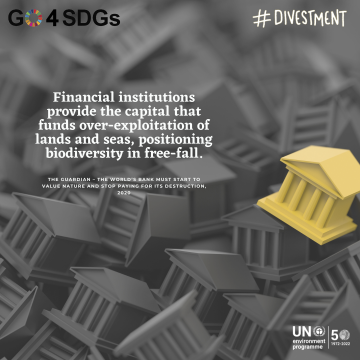
When we buy goods and services, go to restaurants or on vacation, we express our economic influence as we meet our needs and live our aspirations. But we also have the power to make these decisions with the planet in mind.
How does our money impact the planet?
- Pension Funds in the United Kingdom (~ £2.6 trillion) finance economic sectors such as fossil fuels, tobacco, and arms[1].
- 100 oil and gas companies are responsible for 71% of global carbon emissions[2].
- In the United States, buildings are responsible for ~39% of energy use, ~68% of electric power[3] and produce ~38% of CO2 emissions. In particular, heating or cooling our houses are the most energy-consuming and polluting.
Decouple planetary trends with the Anatomy of Action
The Anatomy of Action (AoA) is an evidence-based framework created by UNEP and the Unschool of Disruptive Design to guide every individual toward sustainable everyday action, thereby helping them in kickstart of better and lighter life.
After having identified 5 lifestyles areas of action – food, stuff, move, money, and fun – the Anatomy of Action social media challenge will guide you through 15 concrete changes to adopt sustainable living. Remember that most of the time, what is beneficial for the planet is also healthier for us!
Today, we do not need a few people to be perfect environmentalists, but rather more and more people embracing small steps for collective action, to reshape our habits and aspirations in order to achieve climate targets set out in the Paris Agreement. Businesses and governments are called upon to facilitate citizens’ transition towards eco-conscious routines by providing favourable incentives and infrastructures.
We have already talked of FOOD, STUFF, and MOVE – now it’s time to understand why how we use our MONEY can have a positive (or negative climate) impact!
#EthicalInvesting
Every business we support through our purchases or investments impacts the planet and people’s well-being. As drivers of the global economic demand, we all have a small yet influential power to choose what our money supports – and does not support. And the good news is that sustainable funds are increasing, so investing sustainably and ethically is becoming easier.
Choosing eco-conscious providers for the products and services we consume every day is the first step to move towards implementation of SDG 12 (responsible consumption and production) and many more. However, using our money to invest in ethical financial stocks may have an even more incisive effect. According to the Make My Money Matter campaign, switching an average size pension pot (£30,000 in the UK) to a sustainable option could save as much as 19 tonnes of carbon a year.
See where you can channel your money in banking institutions, brands and businesses which reflect your social and environmental values; when in doubt, buy in locally produced goods in community shops to benefit your local economy. And raise your voice to demand more information and a larger offer of sustainable options for ethical goods and financial portfolios!
#Divestment
To achieve more sustainable consumption and funding, consider divesting from unsustainable economic assets, may it be fossil fuels, tobacco, weapons, etc. Move away from those industries and businesses that act irresponsibly towards the planet, communities, and vulnerable groups.
Switch to banks, energy providers and other companies offering cleaner, renewable options and more sustainable patterns of industrial development. In case they are not available, find out more and consider wind and solar farms directly run by you and your community.
And if you have a retirement fund, find out how it is being managed and push for more sustainable management.
#EnergyPositiveHomes
Did you know that how the construction sector uses natural resources can have a heavy impact on ecosystems and biodiversity[4]? This is even more relevant if we consider that in the last 30 years, urban areas have doubled at the expense of forests, wetlands, and grasslands[5].
Switching to more sustainable modes of construction, to green appliances and environment-friendly habits in our homes plays a pivotal role in reducing global greenhouse gases emissions, thus contributing to mitigate climate change. Suffice to say the “Building & Cities” and “Energy” are core components of UNEP’s six-sector solutions, constituting together almost half of the green technology interventions forecasted to build a carbon-free future!
By turning to more efficient and greener energy sources, you can save your money and make long lasting improvements to your property – which will increase its value. Also, you may enhance the quality of your life and overall comfort. For instance, WHO estimated that in Uganda exposure to cookstove smoke contributes to 13,000 premature death every year[6]. In those contexts, shifting to cleaner and healthier cooking technology also translates into vital improvements in public health.
Investing your money in better home insulation and resource-efficient appliances will lower your energy requirement and turn out to be cost-effective in the long run. Finally, do not underestimate what you can do every day! Opt for natural light, close shutters to prevent overheating, wrap up when it’s cold, save water when showering, wash your clothes at cooler temperatures, collect rainwater for gardening, adjust the temperature of your refrigerator and adjust your temperature by 1 degree in heating or cooling!
It is not too late to join the #AnatomyofAction social media challenge! Proudly share your progress with friends and demonstrate that sustainable living is for everyone, everywhere!
[1] Make My Money Matter – Green Pension Charter, 2021. Retrieved by: https://makemymoneymatter.co.uk/
[2] Griffin & Heede - The Carbon Majors Database: CDP Carbon Majors Report 2017. Retrieved by: https://b8f65cb373b1b7b15feb-c70d8ead6ced550b4d987d7c03fcdd1d.ssl.cf3.rackcdn.com/cms/reports/documents/000/002/327/original/Carbon-Majors-Report-2017.pdf
[3] USA EPA, 2016 - Global Greenhouse Gases Emissions data. Retrieved by: https://www.epa.gov/ghgemissions/global-greenhouse-gas-emissions-data
[4] Data from: http://www.businessandbiodiversity.org/
[5] IPBES 2019 – Global Assessment Report on Biodiversity and Ecosystem Service. Retrieved by: https://knowledge.unccd.int/publications/ipbes-2019-global-assessment-report-biodiversity-and-ecosystem-services
[6] Global Alliance for Clean Cookstoves, 2016 - https://cleancookingalliance.org/
